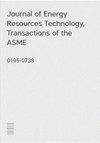Investigation of sub-grid scale turbulence-radiation interaction effects on turbulence energy transport and varying thermophysical properties using large eddy simulation
IF 2.4
3区 工程技术
Q3 ENERGY & FUELS
Journal of Energy Resources Technology-transactions of The Asme
Pub Date : 2023-10-03
DOI:10.1115/1.4063613
引用次数: 0
Abstract
Abstract The main objective of this paper is to investigate sub-grid scale turbulence-radiation interaction (SGS TRI) effects on SGS turbulence kinetic energy (TKE) fluctuations and varying thermophysical properties in a partially premixed combustion system for a laboratory-piloted methane/air flame. The large eddy simulation approach is employed to simulate the turbulence of the compressible reactive flow. SGS quantities, including turbulent stress and fluxes of enthalpy and species in the sub-grid scale, are computed using the standard Smagorinsky-Lilly model. The radiative transfer equation is modeled by applying the spherical harmonic P1 approximation by considering the radiative heat source related to the SGS TRI contribution. Optically thin fluctuation approximation is utilized to simplify the radiative absorption term. A chemical reaction mechanism comprising 41 steps and 16 species is applied to model methane/air mixture combustion. Diffusion flamelet-generated manifolds are employed to govern the species transport equation. About 87% of TKE is resolved by applying the finest grid consisting of 1,822,580 cells. Impacts of SGS TRI on the spatially filtered density, eddy viscosity, SGS velocity and TKE, overall radiative emission, RMS temperature fluctuations, and NO formation are studied. The results reveal that considering SGS TRI in the simulation leads to remarkable discrepancies, particularly in SGS velocity and TKE by 6.70% and 7.40%, respectively. Meanwhile, SGS density and eddy viscosity deviate negligibly in the presence of SGS TRI. Also, the filtered mass fraction of NO reduces up to 17.54% on average by considering TRI.利用大涡模拟研究亚网格尺度湍流-辐射相互作用对湍流能量输运和热物性变化的影响
摘要本文的主要目的是研究亚网格尺度湍流-辐射相互作用(SGS TRI)对实验室引燃甲烷/空气火焰部分预混燃烧系统中SGS湍流动能(TKE)波动和热物理性质变化的影响。采用大涡模拟方法模拟了可压缩反应流的湍流性。使用标准Smagorinsky-Lilly模型计算了包括湍流应力和亚网格尺度的焓通量和物质通量在内的SGS量。考虑与SGS TRI贡献相关的辐射热源,采用球谐P1近似对辐射传递方程进行建模。利用光学薄涨落近似简化了辐射吸收项。采用包含41个步骤和16种物质的化学反应机理模拟甲烷/空气混合燃烧。采用扩散火焰生成流形来控制物种输运方程。大约87%的TKE是通过应用由1,822,580个单元组成的最精细网格来解决的。研究了SGS TRI对空间过滤密度、涡流粘度、SGS速度和TKE、总辐射发射、均方根温度波动和NO生成的影响。结果表明,在模拟中考虑SGS TRI会导致显著差异,特别是SGS速度和TKE分别下降6.70%和7.40%。同时,在SGS TRI的存在下,SGS密度和涡动粘度的偏差可以忽略不计。考虑TRI后,NO的过滤质量分数平均降低17.54%。
本文章由计算机程序翻译,如有差异,请以英文原文为准。
求助全文
约1分钟内获得全文
求助全文
来源期刊
CiteScore
6.40
自引率
30.00%
发文量
213
审稿时长
4.5 months
期刊介绍:
Specific areas of importance including, but not limited to: Fundamentals of thermodynamics such as energy, entropy and exergy, laws of thermodynamics; Thermoeconomics; Alternative and renewable energy sources; Internal combustion engines; (Geo) thermal energy storage and conversion systems; Fundamental combustion of fuels; Energy resource recovery from biomass and solid wastes; Carbon capture; Land and offshore wells drilling; Production and reservoir engineering;, Economics of energy resource exploitation

 求助内容:
求助内容: 应助结果提醒方式:
应助结果提醒方式:


